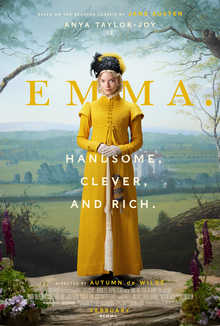
I thought I should voice an opinion on the newest adaption of Emma (2020), which came out last week. I was really excited to see the film, but equally daunted by the possibility of the film proving to be an utter disappointment like Sanditon, which I never bothered to review after the first episode, which ended any similarity to Jane Austen. Fortunately, I was pleasantly surprised, although it is hard for me not to compare it to my favourite version of Emma (1996 with Kate Beckinsale).
Emma (2020) was directed by (the beautifully named) Autumn de Wilde, this being her directorial debut (she is better known for music videos and portraiture), and written by novelist Eleanor Catton. De Wilde's Emma is an entertaining and gorgeous take on the novel, with lavish pastel coloured sets and hilarious performances by well-known, popular actors, such as Bill Nighy and Miranda Hart. Last year, Andrew Davies mostly left out the comedy in Sanditon, so essential to Jane Austen's style of writing, but de Wilde's Emma has comedy in abundance, sure to entertain a wider general audience.
I was delighted *finally* to see costumes so true to the period, with light muslins, sheer fabrics and lots of white (indeed, "a woman can never be too fine while she is all in white" - Edmund Bertram -Mansfield Park). No hair flowing down the shoulders (à la the hideous Billie Piper in Emma and Charlotte in Sanditon). No strangely low waistlines (à la Pride and Prejudice 2005), no modern looking fabrics (several adaptations). Curator's Curio has written a great comprehensive analysis of the costume in this film. The sets, albeit beautiful, do seem a tad too elaborate, with numerous high towers of cakes, excessive floral arrangements etc. The beautiful sets probably reflect de Wilde's artistic background and her sense of the aesthetic, but are perhaps a little too "art for art's sake" to be realistic.
Now to Emma, our feisty, independent "heroine whom no one but myself will much like" (Jane Austen). I feel that the film beautifully captures the spirit of Emma, Anya Taylor-Joy portraying her well; it helps that she is almost the same age and has Emma's captivating hazel eyes, which first haunted me in the period piece, "The Miniaturist".
The chemistry between her and Mr Knightley (Johnny Flynn) is strong, and Johnny Flynn does the role beautifully (as he did in Vanity Fair). However, I would have to agree with many others in that (while Flynn, at 36, is almost the same age as Mr Knightley, 37) he does look too young to be Mr Knightley. I find that the age gap between Emma and Mr Knightley is one of the central themes in the book; after all, he is like the older brother for Emma, being 16 years older than her; being an older family friend, he feels moral responsibility over Emma. The age gap, which is therefore of some significance, does not really show in this film - unlike in 1996, where Mark Strong made a much more credible Knightley.
I enjoyed watching Josh O'Connor (who I thought was brilliant in the Durrells) as a hilarious, off-putting Mr Elton, and Miranda Hart as the annoying spinster, Miss Bates, although (me being finicky) I didn't imagine her to be as tall as the stately Miranda Hart! Bill Nighy makes a great hypochondriac Mr Woodhouse; however, I could have done without his usual snorting.
The dialogue does not appear to follow the book word to word, but the script does stay faithful to the original plot for the most part and, to my relief, the style of speech and manners appear contemporary to Jane Austen (unlike in Sanditon, which took many liberties to suit a more modern audience). The intriguing word game scene at Box Hill has been left out, and there are a couple of scenes at the end, which differ from the original: 1) when Emma goes to the Martins' farm and apologises to Mr Martin, and 2) a (horrendous) proposal scene (with bodily fluids involved, no spoilers however!). I would have liked to have seen a more romantic proposal faithful to the style of Jane Austen.
Also, there seems to be a general trend these days to add nudity in Jane Austen wherever possible, and this film makes no exception. The very first scene where we meet Mr Knightley, we get a view of him stark naked from behind and, while I am no prude, I thought it was unnecessary. Fortunately, de Wilde does not venture further with the nudity and we do not see Emma catching a glimpse of a naked Mr Knightley, which would have suited Andrew Davies very well.
Overall, I felt that Emma has been skilfully made and has clearly been created with a wider audience in mind, with some great comedy elements and an impeccable style. I would love to see it once again to get a better feel of the film and to enjoy those costumes once more.